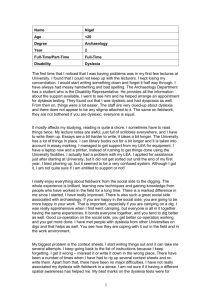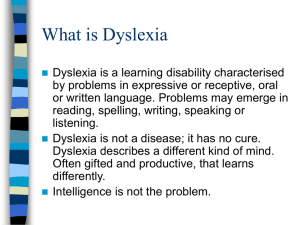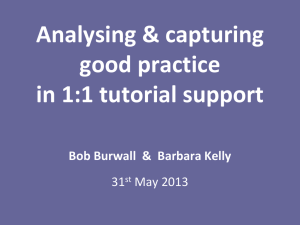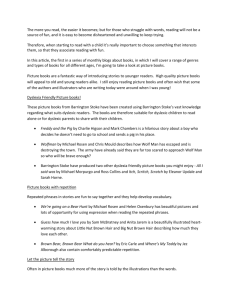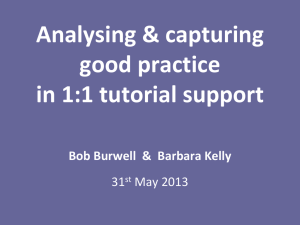Ability Awareness/Learning Styles Training
advertisement
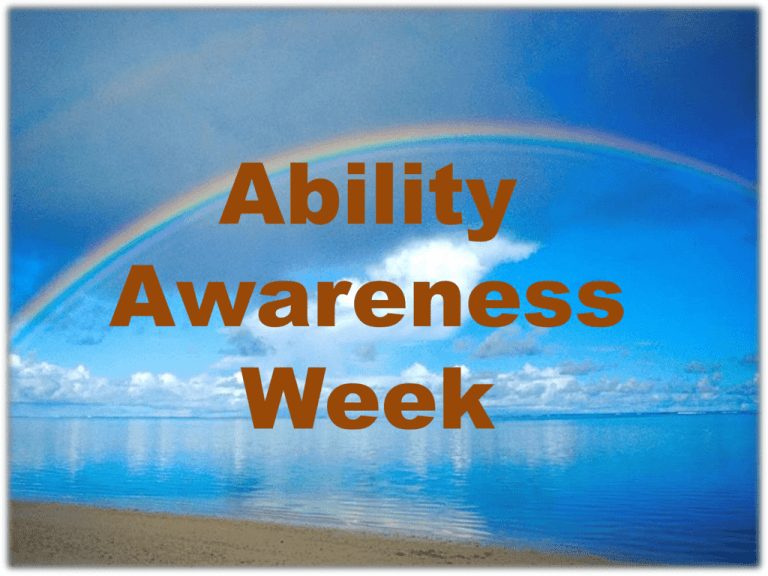
Ability Awareness Week Rainbow of Abilities – Differences Weaknesses Strengths Which end of your rainbow would you want someone to focus upon? Weaknesses Strengths Some differences in ability are easy to see… …while others are not! Can you tell which adult was the first to walk, talk, or read? Similarities Everyone needs: • Respect • Inclusion • Friends When encountering someone with different abilities… • DON’T feel afraid or nervous. • DON’T assume that they are not smart. • DON’T assume that they need help. Ask first (“Would you like some help?”). • Don’t stare, use hurtful words, or passively participate in teasing/bullying. • DO smile and say, “HELLO!” • DO focus on their strengths. • DO include them during lunch, recess, games, and parties. • DO be patient. Keep the rainbow bright for yourself and empower others to do the same! Albert Einstein • Mathematician/Physicist who had a learning disability and did not speak until age 3. He is rumored to have had a very difficult time doing math in school and reportedly had had a very difficult time expressing himself through writing. Sir Isaac Newton • Epilepsy, stuttering • (1643 to 1727) Credited with being the scientist who founded the three laws of motion along. Believed to have discovered gravity by examining a falling apple. Julius Caesar • Epilepsy • This Roman emperor is regarded as one of the most influential men in world history. Alexander the Great • (356 to 323 B.C.) Also known as Alexander III, Ancient Greek king of Macedon • During this time, Epilepsy was believed to be caused by evil spirits. Theodore Roosevelt • (1858 to 1919) A soldier, historian, explorer, naturalist, author, and Governor of New York, and the 26th President of the U.S. Also had poor eye-sight and asthma. George Washington • The first U.S. President is believed to have had a learning difference. He could barely write and had very poor grammar skills. Franklin D. Roosevelt • Roosevelt is believed to have had Polio. He was governor of New York State then elected President of the United States for 4 terms. Woodrow Wilson • U.S. President from 1913-1921. • He was severely dyslexic. Nelson Rockefeller • Former Vice President of the United States: had a learning difference: Dyslexia. Winston Churchill • Dyslexia • Was Prime Minister of the UK during World War II. United States General George Patton • Dyslexia • World War II hero. Thomas Edison • Edison is reported to have had a learning difference. He couldn't read until he was twelve years old and had a very difficult time writing even when he was older. Alexander Graham Bell • Had a learning difference • Invented the telephone Henry Ford • Dyslexic • Invented the motor car Vincent van Gogh • Accute mental illness • Famous painter “Starry Night” Michelangelo • Possible Aspergers • The sculptor of many of the most renowned sculptures of all times. Leonardo Da Vinci • Dyslexic • Responsible for some of the greatest religious paintings in history, Da Vinci excelled not only in painting, but in numerous other disciplines as well. He was a architect, botanist, musician, scientist, mathematician, engineer, inventor, anatomist, painter, sculptor, and writer. His paintings include the "Mona Lisa" and "the Last Supper of Jesus Christ." Francisco Goya • Spanish painter (1746 to 1828): At age 46, an illness left him deaf. He went on to create the most famous Spanish art of the 19th century. Stephen Hawking • Motor Neuron Disease • Communicated using a computer, uses wheelchair to get around independently • This famous astronomical physicist has written many books, including "A Brief History of Time" and "Black Holes and Baby Universes." Charles Dickens (Charles John Huffam Dickens) • Possible Epilepsy • English novelist of the Victorian era • Prolific Writer • Wrote “A Christmas Carol”, “Oliver Twist”, “A Tale of Two Cities” Temple Grandin • Temple Grandin, Ph.D., is the most accomplished and well-known adult with autism in the world. Dr. Grandin didn't talk until she was three and a half years old, communicating her frustration instead by screaming, peeping, and humming. Even though she was considered "weird" in her young school years, she eventually found a mentor, who recognized her interests and abilities. Dr. Grandin later developed her talents into a successful career as a livestockhandling equipment designer, one of very few in the world. Dr. Grandin presently works as a Professor of Animal Science at Colorado State University. She also speaks around the world on both autism and cattle handling. . She has written many best selling books. Tanni Grey-Thompson • • • This athlete is instantly recognized by most people. Formerly Tanni Grey - the Thompson was added following her marriage in 1999 – she has competed in Paralympic Games since 1988, representing Britain at distances ranging from 100 meters to 800 meters. She has won fourteen paralympic medals including nine golds, and has broken over twenty world records. As a wheelchair athlete she was also the winner of five London marathons – in 1992, 1994, 1996, 1998 and 2001. In recent years, she has established herself as a TV presenter. Marla Runyan • Vision loss due to Stargardt Disease. • This athlete represented the Unites States in the 1500 meter track event at the 2000 Olympics. She finished in eighth position, 3.20 seconds behind the gold medal winner. In 1996, Marla set several track and field records at the Paralympics in Atlanta, Georgia. • Following that success, Marla competed in the 2000 Olympics in Sydney, where she became the first legally blind athlete to compete in an Olympics. Bruce Jenner • Dyslexic • Olympic Athlete and Sportscaster Greg Louganis • Dyslexic • Olympic Swimmer Ludwig von Beethoven • Deaf & Asthma • Most noted for his Fifth Symphony. Ludwig van Beethoven • Acquired Deafness near the age of 45. • World renowned pianist and composer from the early 19th Century. Neil Young • This Canadian-born (1945) musician and environmentalist. Regarded by many to be one of the greatest guitarists of his time. In addition to Epilepsy, he is a person with Polio and Diabetes. Michael Bolton • Singer • Famous for ballads from the 1980’s • Deaf in one ear Paul Stanley Born with a defect of the outer ear, deaf in right ear Lead singer of KISS Ray Charles • Disability: Blind since childhood. • Famous for his hits in the 1950's & 1960's, including "Hit the Road Jack." Itzhak Perlman • Contracted polio at age 4, both legs paralyzed as a result. • Famous violinist. He walks with crutches and performs seated. Perlman actively promotes building and transportation accessibility laws. This Israeli violinist is well-known for the technical mastery he has of the violin. Stevie Wonder • Blind since birth • Had numerous hits between the 1960's and 1980's. Rick Allen • Amputation of arm • Famous drummer in the band – Def Leppard. The sudden loss of an arm did not stop his career as a drummer! He rearranged his drum kit to compensate and continued as the band's drummer. Tony Iommi & Ozzy Osbourne • Tony Iommi – Amputation of 2 fingers – Continued his career by creating 2 plastic "fingers" designed to assist him in playing the guitar. Gained fame as the guitar player in Heavy Metal band – Black Sabbath. • Ozzy Osbourne – Dyslexia – Sang as lead vocals in the band - Black Sabbath and had several solo hits, including "Bark at the Moon." Nick Jonas • Nick Jonas of the Jonas Brothers, has type 1 diabetes, a disease that results when the body does not produce the hormone insulin that is needed to convert sugar into energy. • He must take insulin daily. Walt Disney • Dyslexia • Created many cartoon films, including "Fantasia" and "Snow White & The Seven Dwarfs". His first film was the Mickey Mouse cartoon – "Plane Crazy." Tom Cruise • Dyslexic • Hollywood Star • Actor: Mission Impossible, Rain Man Robin Williams • This Hollywood Star was diagnosed with Attention Deficit Hyperactivity Disorder (ADHD) as a child. He never refuses a role related to medicine "Awakenings" and "Patch Adams" are two examples. Marlee Matlin • Marlee Matlin is a stand-up comedian and an actress. In 1987, she won the Academy Award for Best Actress in "Children of a Lesser God". Marlee Matlin lost her hearing during infancy due to Roseola infantum. Bud Abbott • Epilepsy • American producer, comedian and actor. James Earl Jones • Difference: Stuttering • Played the voice of Darth Vader in the movie "Star Wars"; played role as Shakespeare's Othello; appeared in the movie "Conan the Barbarian"; and portrayed a stutterer in the movie "A Family Thing." • In his autobiography "Voice and Silences", Jones wrote that he was "virtually mute" as a child. Christopher Reeve • Never has a person with an ability challenge commanded so much media attention in recent history. Christopher Reeve, unable to walk after a horse-riding injury, dedicated the rest of his life to help others stand confident. He strove to harness the power of medical research to get up & ride again. Bruce Willis • Stuttering • Starred in a number of films, including the "Die Hard" series. Cher • Dyslexia • Performed as part of the Sonny & Cher musical duo. Recorded charttopping hits from the 1960s to late 1990's. Whoopi Goldberg • Learning Difference • Actress and comedian Michael J. Fox • • • • Neurological Disorder – Parkinson’s Actor Starred in Back to the Future movies, television Founded Michael J. Fox Foundation for Parkinson’s Research Lou Ferrigno • 60% deaf, resulting from infections during childhood. • Starred as the Incredible Hulk in the 1970's TV series. Danny Glover • This American actor and star of the movies, “Angels in the Outfield”, "Lethal Weapon" and "Predator 2", was labeled as "retarded" during his youth by school staff. Helen Keller • She was a person with blindness, deafness, and was unable to speak. Harriett Tubman • Abolitionist (1830 to 1913): As a child she was struck by an overseer. The blow fractured her skull and resulted in narcolepsy for the rest of her life. She rescued hundreds of slaves on the underground railroad. Thank you for caring!
